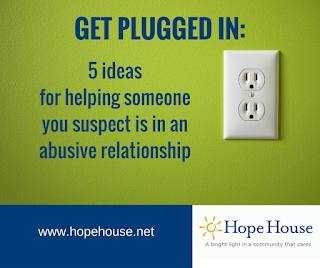Featured Article | Max Londberg | LS Journal | October 5, 2016
To outsiders, a Lee’s Summit woman may have been envied for what appeared to be a healthy, even affluent marital life.
She lived in a large home overlooking water, and her husband, who made considerably more money, often treated her to vacations and encouraged her to spend lavishly.
But far from nurturing his wife, the husband was brandishing their financial means as a way to maintain a sense of dominance and control.
“By encouraging me to spend money, he knew I would assume that I could never get out of the relationship,” the woman said.
She said she was told every week by her husband: “Don’t ever think you could leave; you could never make it on your own.”
The woman wished to remain anonymous for this story. Over the years, she has told few people of the more than three decades she spent in an abusive relationship, “if nothing else out of fear of it getting back to him.”
She spoke from Hope House of Lee’s Summit, a domestic violence abuse shelter. This month is Domestic Violence Awareness Month, and the shelter and others across the country are raising funds to combat the many forms of domestic abuse.
For the woman and staff at Hope House, combating the problem is a 24/7/365 endeavor.
“It’s really difficult to talk about,” the woman said.
Today, she looks for signs of abuse in other women, and when she finds it, she encourages the victim to open up to her.
“I use the word ‘abuse’ a lot because they don’t recognize it as abuse,” she said.
As a child, the woman was raised in what she called an “abusive-type setting,” and her husband showed signs of abusiveness even before they were married.
“We tend to go into relationships because they’re familiar, not because they’re healthy,” she said.
For many years, she blamed herself for the toxic treatment she was subjected to. What begins as invective tends to escalate, she said, into other damaging forms of mistreatment. Her husband, seeking control, threatened her often, told her she could not survive without him and his income.
One in four women will be a victim of domestic violence at some point in her lifetime, and financial abuse is commonly wielded in an attempt to deter women from leaving.
Abusers, said Hope House CEO Mary Anne Metheny, are desperate to retain control in a relationship, and the attempts to subjugate their partners is borne of that need for superiority.
At the worst of times, the Lee’s Summit woman endured death threats.
“There were threats of physical harm: ‘Don’t you ever try to leave me. I’ll kill you if you leave me,’” her husband told her.
Finally, about 10 years ago, the woman discovered Hope House, which led her to a book about abuse. She credits “ The Verbally Abusive Relationship,” by Patricia Evans, for providing the perspective needed to fully recognize her plight and gain the courage to leave.
Hope House helped. The shelter works with women and sometimes men to develop a unique plan for leaving an abusive relationship safely.
“The most dangerous time is when (a victim) leaves,” Metheny said.
Death threats are not uncommon. Metheny said that domestic violence murders often occur in the period after abusers learn their victims are or are trying to leave.
“The reason for that is power and control — they don’t have it anymore,” Metheny said. “They have to increase their efforts to get it back.”
She added that combating domestic violence requires reshaping how we think about it. Today, too much of the onus is placed on the victim.
She doesn’t answer when people ask her why victims don’t just leave. “That’s not the question to ask. The question to ask is, ‘Why is he abusing her?’ And, ‘Why doesn’t he leave instead of her?’”
Finances and fear are the two main reasons women stay, Metheny said.
Hope House offers a range of services in Lee’s Summit and Independence, including 122 beds in its two emergency shelters, support groups, hotel placements, counseling services and others.
For the Lee’s Summit survivor, Hope House helped to liberate her.
“I am 10,000 percent happier than I was. People don’t have to live that way, but sometimes they can’t see a way out,” she said.
To Metheny, helping people find a way out is the goal of Hope House.
“Our goal is to empower people and really help them find their voice again,” Metheny said.





